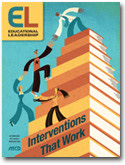Lisa, a student in grade 11 with a history of inappropriate behavior, was ready for me as she sat down in my office. "I know what you're going to say, Ms. Whishaw, but I already took care of it!"
I'd received an angry call from a mother that morning because Lisa had battered her daughter Anna's Facebook page with a series of alarmingly nasty comments. This was a major disappointment because Lisa had been doing so well at improving her behavior. "Yes?" I said wearily.
"I went to Anna this morning and I apologized, really a lot, and we're good now!" This seemed too easy. I asked Lisa what made her apologize, and she said, "I just lay awake last night and realized I wasn't taking ownership and that I was in grade 11 now and had to be responsible." Ownership and responsible—two words from our code of conduct, ROARS.
I thanked and congratulated Lisa and went to check with the victim. Anna said Lisa had apologized, and it was really genuine. Lisa told me later, "It's so hard to be bad at this school because everyone else is being ROARS."
Tupper ROARS
Over the last seven years, Sir Charles Tupper Secondary School in Vancouver has made its code of conduct the center of its identity. So much so that last year, a graduating student told me, "We love ROARS; it's like our last name in our big family—Tupper ROARS."
When I started at Tupper as a new principal, I had no idea how to turn a culture around, but I did have a notion about the role of adults in relation to young people: We have a responsibility to teach and guide our students. Students want and expect this of us, and they love the atmosphere of safety that grows under these conditions.
In previous schools, I had seen teachers who were willing to serve as experts on physics or English but who abrogated their other responsibilities as adults by allowing students to swear or use homophobic epithets or engage in other inappropriate behavior. All too often, adults feel intimidated at taking on students they don't know, or they feel alone because other staff members are not intervening. Many have tried to set limits with students only to have the attempt blow up in their faces.
A good code of conduct provides a safe and universal vehicle for adults to use to support school values in a language everyone understands. At Tupper now, teachers who are nervous about approaching students they may not know with "no swearing please!" can say, "Whoa, is this a ROARS emergency?" All the school's expectations are buried in the one word: ROARS. Many new teachers at Tupper have tentatively tried out a ROARS reminder and seen students immediately pull themselves up short and say something like, "I'm sorry, Miss! I take ownership for that!" These teachers have said to me later, "Really? That's all it took?"
Finding a Voice
Seven years ago, Tupper languished under a negative reputation, fed by its location in a low-income neighborhood, poor test results, and some serious incidents of student misbehavior. After a stirring visit by a principal from a nearby municipality who was passionate about what an effective behavior support program had done for his school, a group of teachers, support staff, an administrator, and students at Tupper began to discuss the values and behaviors they wanted to see at the school. Luckily, the district office was providing money and support for behavior initiatives, and the Tupper administration seized this opportunity.
Respect: We will communicate with others in a positive and respectful way.
Ownership: We will make amends for mistakes by apologizing, repairing, or replacing.
Attitude: We will be well-mannered, compassionate, and helpful.
Responsibility: We will use the student agenda to keep track of our commitments.
Safety: We will follow directions from all staff members.
For the first week of that first year, teachers were required to discuss the code every day in homeroom, until students and staff were nearly sick of it. Now, students learn about ROARS through games, skits, and discussions each year at grade 8 camp, a three-day acculturation activity at the beginning of the school year. And they get some cool T-shirts to remind them of what they learned.
Keeping It Going
By the time I arrived at Tupper, two years after ROARS was implemented, the code was well established in grades 8 and 9, but there were signs of trouble. The code was ignored by most older students, except for a small group of leaders who were commissioned to promote ROARS. The relentless scorn of some of the older students was poised to infect the younger grades, and some staff members seemed ready to lose their will to use ROARS. In addition, as people retired and new teachers came, the code was in danger of becoming watered down unless all new teachers were seized with the importance of ROARS the minute they stepped through the doors.
The staff was roughly divided into three groups in its reception of ROARS: those who provided continuing leadership, those who used the language when they remembered, and a few who never used the language but didn't disparage it. Staff members wanted this to work, but they needed the unstinting support of the administration. I decided that I would use the language whenever I worked with students. That first year, it was a bit of an uphill battle with older students ("ROARS is BS, Ms. Whishaw; no one believes in this #$%^!").
I asked our drama teacher, Heidi Rogers, who was a driving force in the code, to set up a training program for new teachers. She began to produce a ROARS newsletter with language staff could use: "ROARS emergency!" when students are misbehaving or "ROARSalicious!" when students are caught being good. She wrote a school song about ROARS that is popular with the students, and she established a ROARS club to conduct events, give out prizes, and help train new students.
Our Tupper Leadership Card program, in which we encouraged good behavior by giving students cards as a physical token of our recognition for following the code, was languishing. I beefed it up with weekly draws for movie passes. Students who receive cards can take them to an administrator for a signature and a pat on the back—and a chance to be entered in the weekly drawing. (Some kids choose instead to keep their cards and line their lockers with them or post them on their refrigerators at home, but most go for the drawing.) In the last three minutes of school each Friday, I began the drawing with a musical intro and a goofy "It's that time again!" before I read the names of the week's winners. At the end of the year, there's a drawing for a bigger prize, such as an iPod for one lucky student.
We established a ROARS day every other year in which all teachers use a shared curriculum to review the code of conduct with students and give students an opportunity to rewrite or add to the code. The ROARS committee creates a package of materials for students to work through in groups during a particular period on ROARS day. We've used the time to review the code or to get suggestions from students that the committee then uses to refine or expand the code. One year, for example, students suggested and wrote items for a whole section on Internet safety. This event helps everyone in the building refocus on our community values.
To show students they believe in the ROARS code, teachers who have been tardy during the week have started coming with students to Friday school, our weekly after-school make-up sessions. They also now relinquish their cell phones to the office when they ring in class, just as the students have to do. I never asked any staff members to do these things. The teachers decided on these actions to demonstrate how ROARS applies to everyone.
Enjoying the Benefits
Now that every grade has had ROARS from grade 8 on, Tupper has gone from a school where parents would not send their students if they could avoid it to one that parents are willing to go on a waiting list for. There are no longer any grade 12 holdouts. Indeed, the seniors have become powerful role models for the younger students.
The code of conduct hasn't just improved behavior. At the end of the fifth year of intensive ROARS education, the number of classes students failed plummeted by 50 percent in every grade and in every curricular area. The numbers have continued to go down since. Instead of buying into peer pressure that it's uncool to be a good student, students are proud to try to excel.
Why do students respond so well? Why have I not had a discipline issue in the school in the last three years where a student did not "take ownership"? A focus group of students said that because they saw adults at Tupper acknowledging that everyone makes mistakes, they know the adults won't treat isolated behavior episodes as the end of the world, but as opportunities to recover and become better people. The notion that people learn from their mistakes makes students feel safe to take responsibility.
Changing the Culture of Bullying
What about students who come to the school in their senior year, often because they have been transferred because of fighting or drug infractions? Last spring, I met with a "rough and ready" group of boys who meet this description to discuss how they could avoid importing their less socially responsible behaviors to Tupper. The students came to the meeting acting suspicious and defensive because they were expecting a lecture. They left relieved that I was genuinely interested in their ideas. I was floored when one announced, "I love this school. No one bullies anyone else and no one fights." Another followed with, "For the first time in my life I'm passing all my courses." And another, "I used to want to go back to my old school to graduate with my friends this year, but now I don't. If I stay here, I know I can succeed."
Even though these students did not go through the complete ROARS education and probably found the idea lame, the powerful culture the code engendered in the school enabled them to relax from the constant tension of saving face, having to look tough, and feeling forced into violent behaviors. In this atmosphere, students don't easily find a social group that supports antilearning behaviors, so they can better focus on education.
Students are not perfect, and things happen, but most Tupper students are shocked when they hear someone making fun of someone else. Even young, nervous students who see something go too far will venture "that's not very ROARS" in a joking but firm tone that often does the trick. Teachers provide individual behavior support for students who need it, as they do in most schools, but the communal culture of positive behavior and acceptance creates a sense of safety that enhances efforts to work with individuals who need extra support.
I'm in a new school now, but a mother of a girl who graduated last year tracked me down recently to give me a hug. Her daughter had been transferred to Tupper the previous year for extreme insubordination and poor attendance. When she arrived, she was constantly in my office. Gradually, she found that she did not have to fight and defend herself against cruel jokes. She joined the dance program and was admired for her wonderful Hawaiian dance and her great sense of humor. She became one of the greatest proponents of ROARS and began taking ownership for her own progress. Her mother said to me, "It saved her. You should see her now! Thank you!"
'Fessing Up
The ROARS code doesn't prevent all discipline problems, but it has certainly changed how adults and students react to infractions. One day, about 20 minutes into lunch, an irritated teacher called me to come to his wood shop where he was grimly keeping everyone, including himself, from lunch, because no one had confessed to setting a fire when he'd stepped out of the room. Walking down to his classroom, I was frantically trying to think of a way to get a confession and get everyone to lunch.
When I arrived at the class I was none the wiser, so I threw up my hands and said, "This is a ROARS issue. No one is having any fun, or lunch, right now because no one has taken ownership for this." In a fit of exasperation, I looked at the miserable faces of the 25 grade 9 students and began, "Well I don't expect anyone to put up their hand, but…" and up went a little hand. Taken aback, I said "Are you taking ownership?" The student nodded unhappily. "Great! Thank you. Everyone else can go to lunch!"
Two things that happened next really surprised me. First, every student leaving the room walked by the student and thanked him, often placing a comforting hand on his shoulder. Second, after I'd talked with the student about safety and given him some community service, one of his classmates came by my office and asked me, "Ms. Whishaw, you were sort of lenient on John. Was that because he told the truth and took ownership?"
I hadn't really parsed it out, but I realized that the student's owning up encouraged me to help him close the circle—acknowledgement, taking responsibility, making amends. "Yes, indeed," I replied, "well spotted!"







